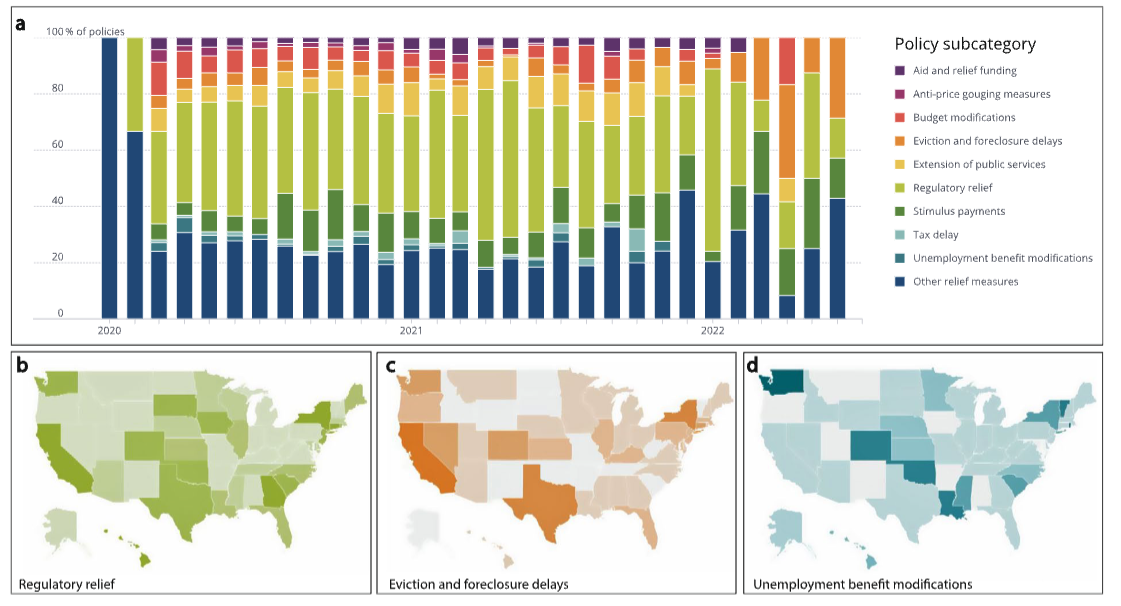
Explore the Research

Open data for COVID-19 policy analysis and mapping - Scientific Data
Scientific Data - Open data for COVID-19 policy analysis and mapping
When the COVID-19 pandemic first started to unfold in early 2020, global policy makers had to act fast to stop the spread. But in the absence of prior experience, few decision makers knew which policies would actually make a difference—or which would be legal to implement. When was the right time to shut down schools? What businesses should be considered “essential?” Who had the power to implement or lift a mask mandate? Our latest publication in Nature Scientific Data looks back at the peak of the pandemic to better understand the rapid-fire policy decisions that helped and hindered mitigation efforts—and to offer an opportunity for researchers and policymakers to learn important public health lessons from COVID-19.
Back in March of 2020, Georgetown University Center for Global Health Science and Security, in collaboration with NTI and Center for Global Development, launched COVID Local, a data-driven guide to frontline COVID closure decisions. We relied on existing guidance from U.S. and global authorities, public health research findings, and lessons observed from countries that had been battling COVID-19 since January 2020 to highlight sensible lockdown policies and procedures. As COVID continued to evolve, it became clear that we would need to dig deeper into potential sources of data if we wanted to make evidence-based policy recommendations.
We set out to collect and organize as much information on COVID-related policies as possible. We eventually collected data on more than 50,000 policies globally from spring 2020 through mid-2022. The data are described in detail in our recent publication in Nature Scientific Data, and are available to view and download at covidamp.org.
The goal of this project, which we’ve called COVID Analysis and Mapping of Policies (COVID AMP), is to facilitate better collection of empirical data on the efficacy of various policies. Public health researchers and economists are invited to use our dataset to pinpoint the most effective interventions implemented during the pandemic. Policymakers can use covidamp.org to find clear guidance on policies that mitigate spread, limit economic impacts, protect patients and healthcare providers, and maintain societal stability. Our data include comprehensive coverage of the United States at the state level, as well as significant coverage of county-level policies. To provide comparison to how other countries addressed similar challenges, we included global data wherever possible, based on the expertise and language skills of the coding team.
While many groups collected data on COVID-19 policies, most were focused on social distancing measures, and very few included economic policies in their collection and analysis. We focused on collecting detailed information about the breadth of policy types and their intended effect on pandemic spread. In our recent paper, we demonstrate use cases that support analysis of, for example, impacts of economic policies on the public health response, the viability of small businesses in each region, and impacts to different vulnerable communities.
Our team has already demonstrated the data set’s potential to inform better policy decisions during times of crisis. In a 2022 analysis published in BMJ Global Health, we captured 221 national-level travel policies issued during the spread of the Omicron variant in November 2021. These travel bans went against the advice of the World Health Organization, but there is a dearth of empirical evidence on their efficacy or lack thereof. Using our dataset, we were able to factor in differences between various travel bans, such as which travelers they targeted or whether they added enhanced screening without shutting borders.
We found that initial reactions almost universally focused on entry bans and flight suspensions from Southern Africa, and that policies continued to target travel from these countries even after community transmission of the Omicron variant was detected elsewhere in the world. While layered testing and quarantine requirements were implemented by some countries later in this 3-week period, these enhanced screening policies were rarely the first response. The timing and conditionality of quarantine and testing requirements were not coordinated between countries or regions, creating logistical complications and burdening travelers with costs. Overall, we found, response measures were rarely tied to specific criteria or adapted to match the unique epidemiology of the new variant.
In brief, travel bans didn’t work because the disease spread was too fast and detection too slow. By the time we knew it was spreading in one country, it had already arrived in several others. Closing borders served only to exacerbate economic impacts to already-hard-hit countries. Yet nuanced policy responses such as enhanced screening would have helped identify cases and allow for targeted interventions.
Our hope is that future policymakers can use our dataset—and the research it enables—to quickly implement evidence-based interventions in the next global disease outbreak.
Follow the Topic
-
Scientific Data

A peer-reviewed, open-access journal for descriptions of datasets, and research that advances the sharing and reuse of scientific data.
Related Collections
With Collections, you can get published faster and increase your visibility.
Data for crop management
Publishing Model: Open Access
Deadline: Apr 17, 2026
Data to support drug discovery
Publishing Model: Open Access
Deadline: Apr 22, 2026





Please sign in or register for FREE
If you are a registered user on Research Communities by Springer Nature, please sign in